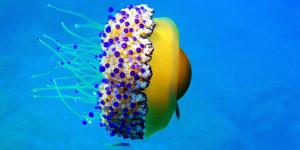Do Jellyfish Have Brains?


It is intriguing to speculate about jellyfish's cognitive capabilities. Unlike many creatures, jellyfish don't possess conventional brains. Instead, they rely on a decentralized network of nerve cells that sparks debates within the scientific community. Investigating whether jellyfish are capable of thinking or consciousness reveals the complexity of their neural organization and behavior.
In the following article by thedailyECO, we delve into whether jellyfish have brains, explore their thought processes, and unveil other captivating insights about these remarkable beings.
Do jellyfish have brains?
Jellyfish exhibit a distinct neurological arrangement compared to creatures with conventional brains. Rather than possessing a centralized brain structure, they boast a decentralized network of nerve cells dispersed throughout their bodies. These cells fulfill sensory and movement control functions, creating a mosaic-like network of nerve pathways instead of a central brain hub.
The nerve cell dynamics within jellyfish are unique when contrasted with vertebrate animals. They exhibit bidirectional signal transmission, an uncommon trait in the animal kingdom. Notably, jellyfish nerve cells lack myelin, a protective sheath commonly found in many animals.
Certain types of jellyfish display a fascinating complexity in their nerve systems. Especially within the Scyphozoan subgroup, which encompasses various jellyfish species, distinct neural setups cater to different needs. One system is designed for swift movements, aiding rapid swimming actions. Another system comes into play for more deliberate tasks, such as controlling their tentacles.
Their nerve cells gather within a circular nervous system, acting as a central hub for sensory and motor functions. Through this network, chemical signals are sent to their muscles, triggering contractions that drive their swimming motions.
When juxtaposed with organisms devoid of structured nervous systems—like sea sponges—jellyfish manifest a higher degree of nerve cell organization. This intricate arrangement equips them to respond to stimuli, execute fundamental functions such as swimming and foraging, and react to environmental variables like light and temperature shifts.
Despite not reaching the complexity of vertebrate brains, the jellyfish's neural framework remains remarkably adept at ensuring their underwater survival and adaptability.
You might find interest in another article, where we delve into the topic of which animal possesses the largest brain.

Can jellyfish think?
The question whether jellyfish possess the capacity for thought remains a debated topic within the scientific community.
Given that jellyfish lack a conventional brain, their method of information processing and potential for conscious thought present intricate and contentious considerations.
Certain studies propose that jellyfish exhibit behaviors that could be construed as responses to distinct stimuli, hinting at a rudimentary form of information processing. For instance, jellyfish display the ability to detect prey and predators, along with reactions to alterations in light and water temperature. Nevertheless, these behaviors might be rooted more in instinct and automatism than indicative of conscious contemplation.
Are jellyfish aware they are alive?
As mentioned before, given their lack of a centralized brain and complex cognitive processes, determining if jellyfish are aware of their own life is a challenging and debated topic.
While they exhibit responses to various stimuli and display behaviors that suggest information processing, these reactions are often considered more instinctive and automatic, rather than indicative of self-awareness or consciousness.
Do jellyfish choose to sting you?
Jellyfish stinging is typically a defensive mechanism triggered by contact with their specialized cells, called cnidocytes, which contain venomous structures known as nematocysts. When touched, these cells release venom into the skin, serving as a means of deterring potential threats or capturing prey.
While some experts suggest that jellyfish stinging could be a reflexive response to external stimuli, labeling it as a conscious choice is likely an overinterpretation. Rather than active decision-making, it appears that stinging is more of an automatic reaction designed to protect the jellyfish from perceived danger.
Be sure not to miss this other article where we explore whether plants know when they are being eaten.
Other interesting facts about jellyfish
Jellyfish are renowned for more than just their lack of brains. Here, we've compiled a collection of fascinating facts about these captivating creatures:
- The majority of jellyfish inhabit marine environments, but there exists a freshwater variety known as Craspedacusta sowerbii.
- Jellyfish exhibit bell- or umbrella-shaped bodies, featuring a dense gelatinous layer known as the mesoglea. This characteristic not only contributes to their buoyancy but also enhances their volume. Positioned at the center of their concave side is their mouth, surrounded by their characteristic tentacles.
- A standout feature of jellyfish is their possession of stinging cell organelles called nematocysts. These structures are abundantly found in their tentacles and serve both as tools to capture prey and as a defense mechanism.
- Dioecious in nature, the majority of jellyfish have separate sexes. During the sexual reproduction phase, they release eggs and sperm into the water for external fertilization. Alternatively, some species might engage in internal fertilization within the body of the female jellyfish.
- Certain jellyfish species possess the remarkable ability of bioluminescence, meaning they can produce their own light. This luminous phenomenon serves purposes such as attracting prey and, intriguingly, warning predators of their toxic nature.
- Some jellyfish species have an astonishing ability to regenerate lost body parts. If a jellyfish loses a tentacle or even part of its bell, it can regenerate the missing section.
- Jellyfish have been around for an incredibly long time, with fossil evidence suggesting their existence dating back to over 500 million years ago.
- Despite their seemingly delicate nature, jellyfish can have a significant impact on marine ecosystems. When their populations explode, they can outcompete other species for resources, leading to imbalances in marine food chains.
Make sure you don't overlook our other article, where we explore whether jellyfish possess eyes.
If you want to read similar articles to Do Jellyfish Have Brains?, we recommend you visit our Facts about animals category.
- Hickman, C.P., Roberts, L.S., & Larson, A. (2000). "Integrated principles of zoology".
- Ruppert, EE and Barnes, RD (1994). Invertebrate zoology. Sixth edition.






